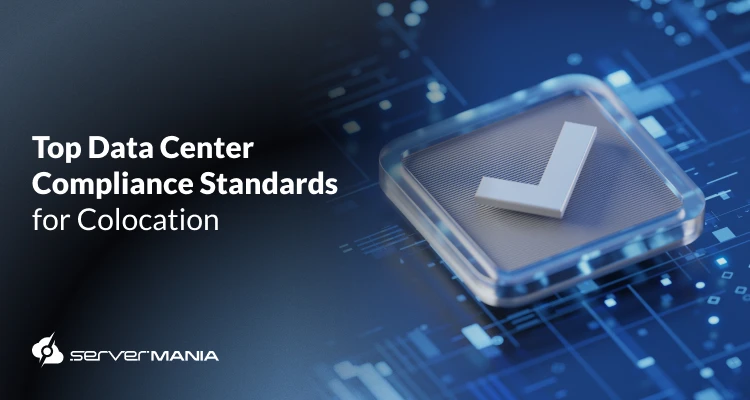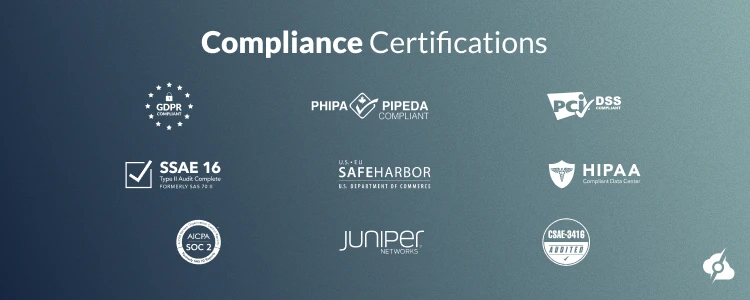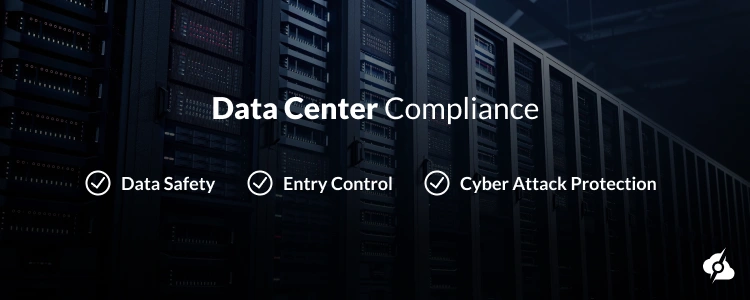Top Data Center Compliance Standards for Colocation

Most organizations and businesses alike, strongly rely on data centers to protect and store their critical components, assets and data. In the meantime, cyber threats are growing stronger and more powerful than ever, which why data center compliance requirements have become so important.
Data center compliance ensures that these facilities meet stringent standards for data security, protecting against malicious intents and building trust with clients.
That’s why ServerMania, a trusted name in the industry, excels as a hosting provider, a cutting-edge cloud computing solution through AraCloud, and colocation services. In this article, we’ll explore the top compliance standards that shape colocation services in 2025 and why partnering with a provider like ServerMania is a smart move.

Why is Data Center Compliance That Important?
There are several critical factors that make data center compliance requirements critical in 2025:
Safety of Sensitive Data
When a data center is following the compliance standards, customers feel safe about their critical data and assets, since they are secured with the highest level of priority. The compliance standards dictate ultimate security measures, such as encryption and access controls.
This is crucial to protect data from unauthorized access as many high-profile businesses are being targeted by cyber attacks every day. For many organizations, small-scaled or enterprise-grade, these protocols are very important, as even the smallest leaks can lead to financial loss and private exposure.
Read Also: Data Center Tiers Explained
Data Breaches Protection
Data center operations under complete compliance control drastically reduce the risks of data breaches and prevent cyber attacks early in their development. By following the strict data center requirements, these hosting facilities often establish a well defined process related to security, often including robust firewalls, intrusion detection, and regular inspections.
These systems ultimately help colocation providers such as ServerMania to neutralize all cyber threats and ultimately improve the service availability.
Ensuring Business Continuity
Whenever a data center is compliant with the standards, it will always prioritize client’s protection by introducing numerous ways for disaster recovery. This sometimes means redundant power, cooling systems, fire suppression, uninterruptible power supplies and much more features that keep it running even during natural disasters.
This reliability and operational efficiency is what many businesses in 2025 focus on, to acquire the operational transparency and secure colocation for their physical infrastructure.
Meeting Regulatory Standards
The compliance shows data centers the correct way of managing regulatory standards, such as those for healthcare or finance, in order to avoid fees and taxes. Therefore, colocation facilities should follow all these strict rules, including thorough documentation and external audits.
So, partnering with a compliant provider such as ServerMania, you will ensure that your business meets all the needed obligations without the worry of potential drawbacks.
Building Customer Trust
Data center compliance ultimately builds confidence by showing customers that their data is handled responsibly with care. Whenever colocation hosting providers comply with the security protocols and maintain all needed certifications, they clearly demonstrate their commitment.
This level of transparency can rarely be found in 2025, so ServerMania is proud to provide customers with the peace of mind that every business requires to operate smoothly.
DEFINITION:
Colocation compliance refers to the adherence to regulatory standards, industry frameworks, and security requirements by both the colocation sites and the customer’s equipment and data hosted within those facilities.

The Top Compliance Security Standards for 2025
The data center compliance standards that we’re about to unwrap are the foundation of data centers in 2025 whether for dedicated hosting, cloud services or colocation.
In 2025 data security and processing integrity should be number one priority, hence guaranteeing this level of colocation security is only possible via security systems that are compliant with the standards.
SOC 2 (Service Organization Control 2)
Any organizations and business that trust data center colocation facilities should look for the golden SOC 2 standard across all compliance requirements. Developed and deployed by AICPA, this security compliance standard focuses on the data management by data center facilities emphasizing security.
In 2025, SOC 2 remains the most-important security standard for organizations and business revolving around SaaS and handling sensitive financial data. This standard ensures the data remains protected by enforcing regular audits, that are often tailored as per the specific operations of the SaaS organization.
| Focus Areas | Security Measures, Data Center Availability, Processing Integrity, Data Disaster Recovery and Confidentiality. |
| Industries | SaaS (Software as a Service), FinTech, MarTech, e-Commerce, and Other Businesses With Sensitive Client Data. |
| Requirements | Constant and Internal Audits, Continuous Monitoring, Security Checks, Third-Party Audits and Inspections. |
| Certification | Annual Inspection by Independent Auditors as well as Detailed Reporting. |
Why SOC 2 Matters for Colocation?
SOC 2 compliance instantly shows that certain data center provider prioritizes data management and customer’s safety, making it a must for colocation data centers.
By managing everything from encryption, entry logs and deploying constant observation (monitoring), the data center facility ensures that only authorized personnel handle critical systems. For businesses, this instantly breathes confidence in their colocation partner’s ability to protect essential client data.
Note: ServerMania doesn’t just meetSOC 2 standards — it also maintains SOC 1 compliance for financial report assurance, and SOC 2-HIPAA compliance, aligning data center operations with rigorous healthcare protection requirements.
HITRUST (Health Information Trust Alliance)
HITRUST is a powerful, certifiable framework that blends together multiple standards, like HIPAA, ISO, PCI DSS, and NIST into a single, comprehensive security and risk management program.
This makes HITRUST especially critical for colocation data centers serving healthcare, finance, and large enterprises that handle sensitive regulated data. It shows customers that the data center doesn’t just meet one compliance requirement, but an integrated, multi-standard approach to security/privacy.
| Focus Areas | Risk Management, Ensuring Data Protection, Incident Management, Regulatory Compliance Mapping, and Continuous Monitoring. |
| Industries | Healthcare, Insurance, Financial Services, SaaS, and Any Enterprise Navigating Multiple Compliance Frameworks. |
| Requirements | Comprehensive Risk Assessments, Unified Control Framework, Ongoing Policy and Procedure Management, Regular Internal Audits, and External Validated Assessments. |
| Certification | HITRUST CSF Certification involves a validated assessment by an approved HITRUST assessor, with ongoing updates to meet evolving regulatory demands. |
Why HITRUST Matters for Colocation?
HITRUST certification shows a colocation provider can meet strict, multi-standard security and privacy requirements. By partnering with a HITRUST-compliant providers like ServerMania, businesses gain confidence that their sensitive data is protected under the highest regulatory and industry frameworks.
ISO 27001 (Information Security Management System)
ISO 27001 is the most globally accepted standard for managing information security, which makes it the foundation of 2025 data center compliance. This security compliance standard delivers a method for catching risks to sensitive data early, and ultimate protection for data center facilities.
Hence, it’s applicable to any businesses that work internationally or handling critical customer data. So being compliant with ISO 27001, instantly shows your customers that you’re committed to their security. This ultimately helps colocation centers meet rising expectations in a world of evolving cyber attacks.
| Focus Areas | Risk Management, Security Controls, Data Privacy, and Incident Response. |
| Industries | Finance, Tech, Healthcare, and Massive Enterprises with Cross-Boarder Operations. |
| Requirements | Risk Assessment, Policy Implementation, Continuous Improvement and Regular Audits. |
| Certification | Multi-Staged Audits, Accredited Bodies and Ongoing Compliance Monitoring. |
Why ISO 27001 Matters for Colocation?
In short, ISO 27001 ensures that data center colocation providers deploy and maintain a secure infrastructure that protects customer’s info via environmental controls. Some of these controls include data disaster recovery capabilities, strict access control and physical security.
Hence any businesses and organizations that are compliant with ISO 27001, ensure their customer’s info is safe and secure. This ultimately brings trust and confidence across the colocation customers.
HIPAA (Health Insurance Portability and Accountability Act)
If your organization or business handles a lot of medical records, reports and client information, HIPAA is not just a tool for checking—it’s the critical piece of data center compliance for the healthcare sector. Deployed from the Health Insurance Portability and Accountability Act, this critical standard sets strict requirements and rules to protect sensitive health information, or PHI.
In 2025, with telehealth growing faster than ever and cyber attacks making headlines, HIPAA ensures colocation data centers keep patient data locked down tight.
| Focus Areas | Protected Health Information, Data Safety, and Potential Breach Notifications/Alerts. |
| Industries | Healthcare Providers, Insurer Companies, Telehealth, and Medical Technology Firms. |
| Requirements | Encryption, Entry Logs, Physical Access Controls, Regular Risk Assessments and Inspection. |
| Certification | Ongoing Standard Compliance, Internal and Regular Audits, Federal Oversight Prevention. |
Why HIPAA Matters for Colocation?
HIPAA compliance is a complete game-changer for colocation, serving healthcare or host for clients working with critical information.
This compliance standard demands multiple layers of data center security such as cooling systems to prevent outages and detection systems for intruders. This not only ensures that patient data stays safe, but also guarantee uptime for critical healthcare services.
PCI DSS (Payment Card Industry Data Security Standard)
If you’re running an online store through colocation offers, PCI DSS is the most important standard that you should be looking for when choosing a provider.
This standard, deployed by the payment card industry, ensures that data centers handling sensitive financial data are one step ahead of the cyber threats. In 2025, with e-commerce shops rising faster than ever, PCI DSS is non-negotiable for colocation data centers.
| Focus Areas | Cardholder Data Safety, Encryption, and Vulnerability Management |
| Industries | E-commerce, Retail, Payment Processors, FinTech and MarTech |
| Requirements | Secure Networks, Access Controls, Regular Testing, and Security Policies |
| Certification | Annual Assessments, Quarterly Scans, and other Potential External Inspections |
Why PCI DSS Matters for Colocation?
PCI DSS compliance keeps colocation data centers on a constant watch for ongoing financial threats and dangers to their customers.
For businesses and clients, PCI DSS means their payment systems are running along without hiccups, building trust and confidence. A PCI DSS-compliant data center is a must to avoid potential financial drawbacks with colocation.
GDPR (General Data Protection Regulation)
For any businesses and organization alike storing European customer’s data, GDPR offers the regulatory framework filling in all the security gaps.
This regulation is born in the EU, and is all about data privacy and protecting customer information with by identifying gaps, and deploying risk mitigation strategies. In 2025, with global businesses leaning on colocation services from data centers, GDPR compliance is a must.
| Focus Areas | Data Safety, User Consent, Right to Erasure, and Data Breach Notifications and Alerts |
| Industries | Tech, e-Commerce, Marketing, and Any Businesses with EU Customers and Clients |
| Requirements | Data Protection Policies, Access Logs, and Cross-Border Data Transfer Rules |
| Certification | Regular Audits , Data Protection Officer, and Compliance Documentation Tracking |
Why GDPR Matters for Colocation?
GDPR provides all colocation suppliers with compliance strategy for data with environmental controls and thorough documentation. For businesses, it’s essential to keep EU customers safe and avoid the heavy penalties that would follow up otherwise.
A GDPR-compliant data center means your global operations stay smooth, with no nasty surprises from regulators breathing down your neck.
NIST 800-53 (National Institute of Standards and Technology)
If your business operations are dealing with government contracts, compliance gaps are unacceptable, and NIST 800-53 is your way to full secure your physical infrastructure.
This U.S. standard sets these tough rules for operational efficiency and operation transparency, and in 2025 this goes beyond government workloads. All the colocation centers leaning on NIST 800-53 use the most hardcore security controls to ensure data protection and verify secure systems management.
| Focus Areas | Security Controls, Risk Management, Incident Response, Access Controls and Process Related Audits |
| Industries | Government, Defense, Finance, and Organizations with Critical Infrastructure |
| Requirements | Uninterruptible Power Supply, Ongoing Monitoring, Physical Security and Financial Reporting |
| Certification | Regular Audits, Secure Systems, Compliance Reporting, Processing Integrity, and Federal Oversight |
Why NIST 800-53 Matters for Colocation?
NIST 800-53 pushes colocation suppliers to build secure colocation with operational transparency, service availability and only authorized personnel access.
For businesses, this data center compliance standard is a guarantee for everything from a fully secure infrastructure, to secure data and fire suppression systems. Hence, choosing a NIST-compliant facility means your critical components stay safe, no matter how intense the regulatory or cyber pressure gets.

Data Center Compliance Standards – (FAQ)
1. What are data center compliance standards?
The compliance standards are a predefined set of compliance strategy rules that ensure data centers protect sensitive customer data and regulate data center operations.
2. Why do colocation providers need compliance?
A complete compliance proves that a data center’s security measures, such as physical access controls, internal audits, and fire suppression systems, meet strict standards. This is critical for avoiding any data breaches across service organizations, building customer’s trust and guaranteeing colocation security.
See Also: Server Mania Data Center Solutions
3. How often are compliance audits required?
Most data center standards, such as SOC 2 or ISO 27001, need annual external audits and ongoing monitoring. Regular checks ensure data center operations stay secure and catch any compliance gaps before they become problems.
4. Are compliance standards expensive to meet?
Implementing standards like HIPAA or PCI DSS can cost a bit, with audits and security systems adding up. But the investment prevents fines and protects business continuity, saving you bigger headaches.
5. Can small businesses benefit from compliant data centers?
Absolutely! A compliant data center operations provider offers small businesses enterprise-grade data protection without the setup costs.
6. What happens if a data center isn’t compliant?
Non-compliance exposes data centers to risks such as data breaches, fines, and lost trust. Without standards like GDPR, a colocation data center could face legal heat or downtime, disrupting your business operations and reputation.
7. How do I choose a compliant hosting provider?
Look for data center certifications, transparent access logs, and robust colocation security. A provider like ServerMania, with a focus on data center compliance, ensures your data stays safe and secure.
Explore ServerMania colocation pricing or contact an expert to get started today!
Was this page helpful?

